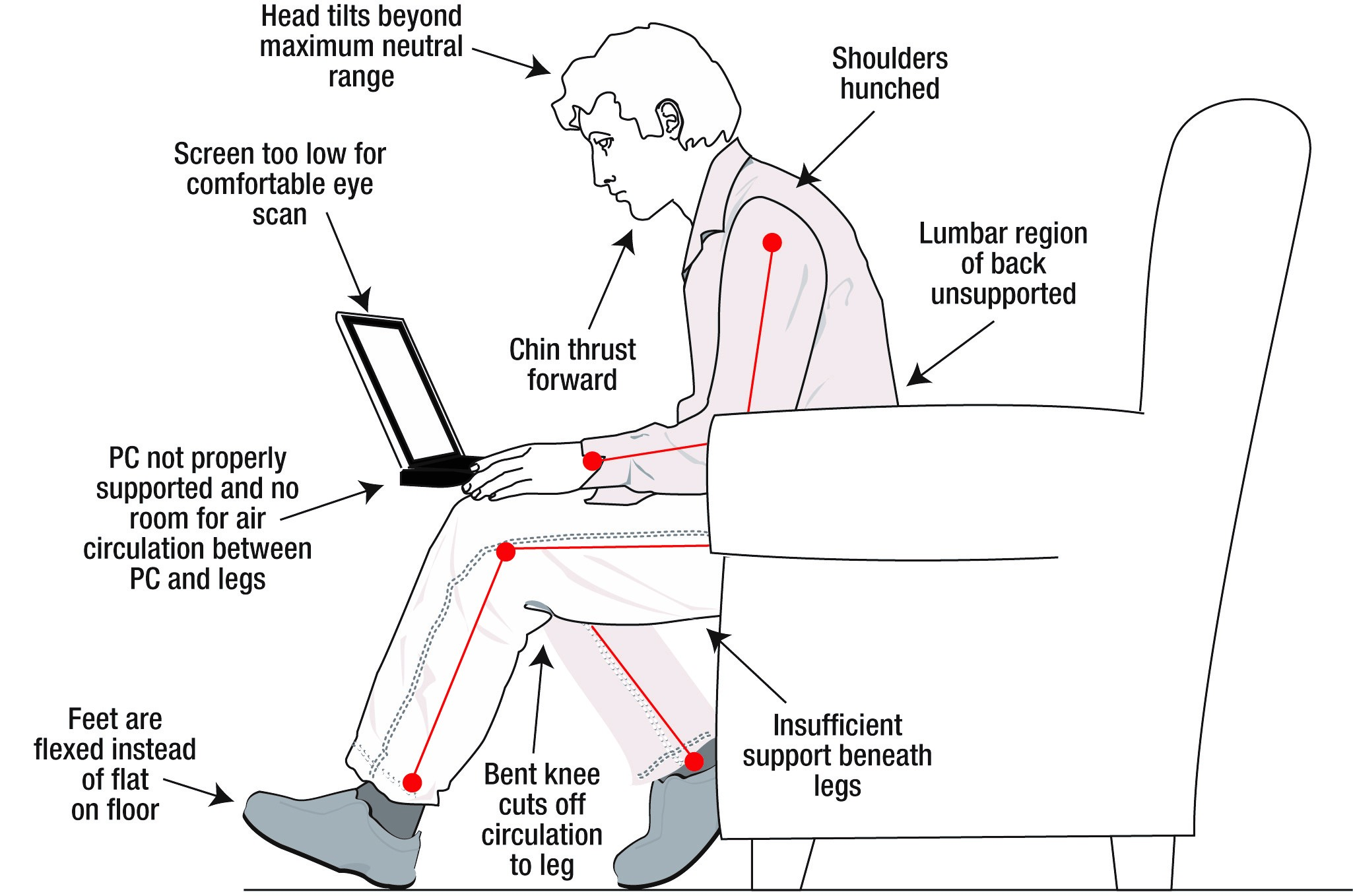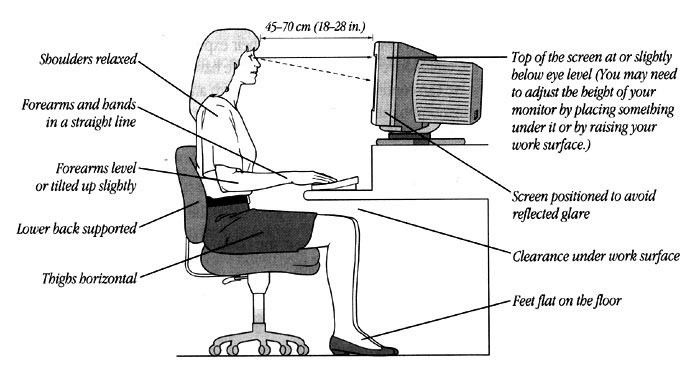
15 Jan Common Computer-Related Injuries (CRS)
Computer-related injuries are usually caused by poor sitting postures and improper workspace arrangement. Typical injuries include
- Posterior cervical dorsal syndrome (“Computer Back”)
- “Mouse shoulder”
- Carpal tunnel syndrome
- Tennis elbow
- Lumbar sprains and strains
- Disc injuries

Posterior cervical dorsal syndrome (“Computer Back”)
A very common postural syndrome in modern society involves excessive rearward curving of your lower, middle, and upper back; forward drawn head; rounded shoulders; and excessive forward curving of your upper neck. This syndrome has been given several names including sterno-symphyseal syndrome, posterior cervical-dorsal syndrome, or more commonly, COMPUTER BACK OR STUDENT SYNDROME. It is a natural result of prolonged sitting work, especially with computers. These postural defects in turn can cause
- Headaches
- Excessive muscle tension in your neck, chest, shoulders, arms and forearms, back, abdomen, hips, and thighs and legs
- Strains and trigger points the above muscles
- Joint dysfunction and sprains in your neck, back, and ribs
- Increased loading on the intervertebral discs of your spine
- Impaired function of your breathing muscle (your diaphragm), causing the muscles lifting your upper ribs and shoulders to become overactive and subject to problems
“Mouse shoulder”
“Mouse shoulder” (as good a name as any) is a syndrome arising from prolonged elevation and bracing of the shoulder to accommodate an inappropriately positioned mouse, or performing short-range movements of the mouse, or (usually) both. This syndrome results in severe shoulder and shoulder blade muscle spasm (in the trapezius, deltoid, and teres muscles) and trigger points with referred pain in the arm. If left untreated, this problem can develop into a much more serious rotator cuff injury.
Carpal tunnel syndrome
Carpal tunnel syndrome arises primarily from compression of the median nerve as it passes through the wrist. It is the most common nerve compression injury in the body and it is the most common and costly RSI (Repitive Strain Injury). Typical symptoms include
- Paraesthesias (abnormal sensations) such as tingling and numbness in the thumb and index and middle fingers
- Night pain
- Weakness in grasping, thumb and index finger pinching, and other thumb movements
- Clumsiness, such as awkward hand movements and dropping things
Tennis elbow
Classic tennis elbow, or lateral epicondylitis, is another type of RSI. It is a tendonitis affecting the common extensor tendon at the lateral (outside) area of the elbow. Tennis elbow is a very common cause of elbow and forearm pain. It can cause mild to severe pain in the lateral elbow and may be aggravated by grasping and excessive finger motions. The pain may also radiate up the arm or down into the forearm.
Lumbar Sprains and Strains
Lumbar spine sprains (ligament or joint capsule tears) and strains (muscle or tendon tears) are common in office workers due to the high loads placed on the spine during sitting. Sprains and strains may cause back and hip pain as well as muscle swelling and tightness.
Disc Injuries
Increased loading on the spine due to prolonged and faulty sitting postures may cause sprains of the outer (annular) fibers of the intervertebral discs. In more advanced cases the soft inner material (nucleus) of the disc may protrude into or even through the annular fibers of the disc, resulting in a herniated disc. Herniated discs may cause back pain, leg pain and altered sensation down to the foot, weakness, walking difficulties, or combination of these symptoms.
Eight basic steps for preventing common computer-related injuries

The key to preventing common computer-related injuries is to identify and remove the abnormal stresses acting on your body while you work. Eight ways to do this are
- Adopt proper sitting posture by changing the arrangement of your desk, chair, and computer screen and keyboard. Check yourself to ensure you maintain proper posture throughout the day. A good idea is to have someone else watch your posture while you work.
- Support easily compromised areas of the body. A lumbar support pillow and wrist supports for your keyboard and mouse can prevent many injuries.
- Don’t sit too long at your desk, get up and move around at least every half-hour.
- Recognize that the psychological stress of your work could be altering your posture. Slumped shoulders and shoulders pulled upward are common self-defense postures.
- Improve your overall fitness level to make your muscles strong and flexible so that they do not fatigue as quickly. Start simple, balanced exercise program that you will continue, for example, brisk walking at lunch.
- Stretch and relax your tight (or overactive) muscles and strengthen and tone up your weak (or underactive) muscles.
- At the end of your long day, relax your muscles in a warm bath or shower. You deserve it!


No Comments